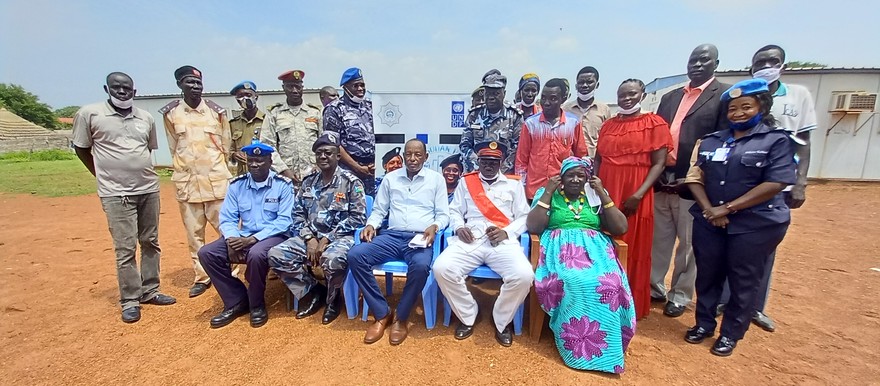The South Sudan National Police service (SSNPS) on Wednesday trained twenty people from different groups in community policing techniques to prevent crimes in Kuajok town, Warrap State.
The one-day training workshop which was organized by SSNPS, with support from UNDP, trained members from the Police Community Relations Committee (PCRC), civil society, women, and youth groups on how to support the police in containing rising crime in the state.
The PCRC is the societal committee formed in 2011, composed of 30 members based in Kuajok town and mandated to help support the police by reporting crimes in the community.
The head of the national team, who is also the Director of Transformation, Research and Planning, Maj. General Dr. Stephen Warikozi, said during the closing remark on Wednesday that the National Police Service Act considers community participation key in combating crimes.
"South Sudan police Act 2009 in article 15 says there should be the establishment of community policing to help police in reporting crimes occurring in the community to Police stations. Community policing helps to supervise and mobilize communities to create good relationships with the police. Police cannot operate without community, so police can't be found everywhere and community is everywhere, it’s simple indeed, through the community relations committee members who are here, you can report crimes to police," Gen. Warikozi said.
Warrap Civil Society Organization Alliance (WCSOA) representative, Angelo Dut Athian, urged the government to disarm communities to ease community policing so that perpetrators are brought to book.
"There is a gap between community policing and the police concerning crime reports. Perpetrators are not reported because of inadequate police and the fear that everyone is carrying a gun, if you report, you will be killed, and this creates insecurity. Government must disarm all people carrying guns to allow community policing to operate its work easily," Dut said.
The deputy chairperson of the PCRC, Wol Mathuc, said his group faces many challenges including mobility and called on the government to support their activities.
"PCRC can support the government in so many ways. We are trained on how to control conflicts among communities by reporting those carrying small arms and crimes to the police. Our challenge is the movement of members of PCRC to counties. I call state government and national police headquarters to support the activities of Community policing because we are just concentrating in the state capital" he said.
The UNDP security specialist, George Madimba, said both the community and police should work together to support peace and security within the state.
"Police and community cannot work in isolation. It is good to work together as community police. The idea is a very good thing so the UNDP is happy to support this task PCRC is doing by enlightening the community to share information. As UNDP, we shall walk the talk, we shall work together to ensure that the community embraces community policing and people of South Sudan stay in a safer place" Madimba said.
Meanwhile, the state minister of cabinet affairs, Akech Tong Aleu, admitted that the crime rate is soaring and is almost beyond government control in Warrap State due to the proliferation of guns.
"I urge you to extend the community policing to counties and Payams so that police get enough information. The firearms in the hands of the community is a problem, I failed myself when I was governor. I had managed to peacefully disarm my community but the neighboring states didn't disarm their people and that brought blame on me when they were attacked by armed communities from the other states. There is a need to comprehensively disarm communities of Warrap and the neighboring states at once," minister Tong said.




